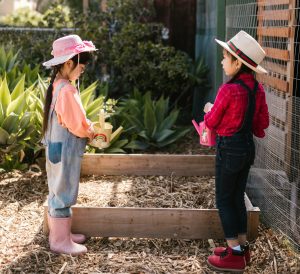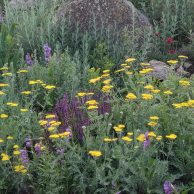 We’re excited that the City of Boulder is gathering feedback from the community about how we use our yards, preferences for landscaping and interest in a citywide effort to create pollinator habitat patches and pathways. Pollinator pathways connect safe, pesticide-free native plant patches of habitat for bees, birds, butterflies, and other wildlife to provide food and nesting sites. Native pollinators are vital to our ecosystems and pathways support pollinator populations, as well as safe passage for movement across the city.
We’re excited that the City of Boulder is gathering feedback from the community about how we use our yards, preferences for landscaping and interest in a citywide effort to create pollinator habitat patches and pathways. Pollinator pathways connect safe, pesticide-free native plant patches of habitat for bees, birds, butterflies, and other wildlife to provide food and nesting sites. Native pollinators are vital to our ecosystems and pathways support pollinator populations, as well as safe passage for movement across the city.
Each of us has different preferences for landscaping our yards and we use our yards in different ways. The city is asking for community members to share their opinions and help the city and its partners to better understand what the community wants and needs. Visit BeHeardBoulder to provide your input and please share with your friends, neighborhoods and networks.
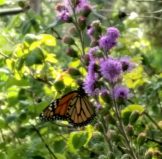
Monarch butterfly on Liatris ligulistylis
Long before there were settler’s homes, towns and farms in this area, the natural vegetation provided continuous cover and feeding opportunities for pollinators and other wildlife. Urban and suburban development, industrial farming and the pervasive use of toxic pesticides and herbicides have seriously disrupted their crucial habitat.
By choosing plants to create habitat for pollinators and allowing shelter and water sources for them, we gardeners can make a significant positive impact on their survival. Most pollinators have very small home ranges. By understanding the vegetation patterns of the farm, forest, or your neighbors landscape, you can make planting choices that support the pollinators’ need for food and shelter as they move through the landscape.
The three best ways to help pollinators are:
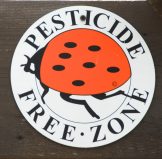
- Stop or reduce your pesticide use, especially insecticides and fungicides. This doesn’t mean that your plants have to look unkempt; Harlequin’s has non-toxic alternatives and alternative plants. If you use a lawn care company, chat with them about what they’re using.
- Provide safe habitat. This includes not only safe pesticide-free plants that keep your garden blooming all season (ALL of Harlequins’ plants are free of bee-killing neonicotinoids), but nesting habitat as well. About 75% of our native bees live in the ground in plain-old Colorado dirt. For the remaining cavity-nesters, we have clean culture materials like replaceable tube liners for (next year’s) mason bees and variety packs for other species.
- Encourage others to do the same. This includes your neighbors, HOAs, City and County lands, roadsides, and right of ways. You can share our pollinator plant lists with others to give them ideas.
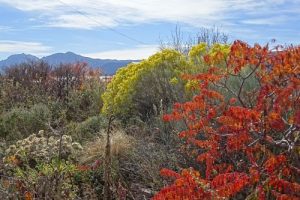
Since our founding in 1992 Harlequin’s Gardens has been dedicated to supporting Life in all its complexity and interconnectedness. We provide pollinator-safe, toxin-free plants, products and advice. Our choices of plants to grow and sell are guided by our assessment of their environmental appropriateness and value, not simply by their novelty or flashy new colors and forms. We offer an extensive selection of native plants, many of them unique to our sector of the region and vital to the local pollinators and wildlife with which they co-evolved. We invite you to peruse our detailed lists of plants for supporting a variety of pollinators, below.
And we hope you will take a few moments to participate in the City of Boulder survey.
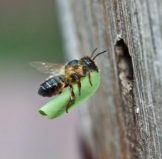 Check out our pollinator resources!
Check out our pollinator resources!
Flowers to Attract Butterflies and Hummingbirds
Plants for Various Pollinators
Plants to Support Honeybees & Wild Bees
